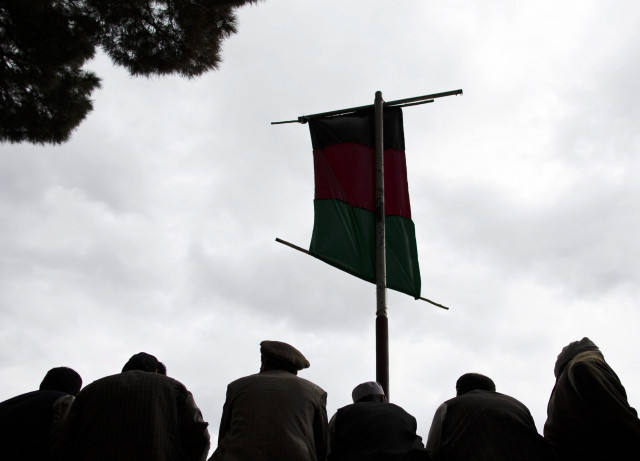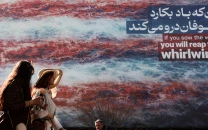Afghanistan: The military battle that precedes the political one
Militants still have control in certain parts of the country and have vowed to disrupt the elections.

Afghan supporters attend campaign rally. PHOTO: AFP
The men of the Afghan army's fourth infantry brigade have been tasked with clearing the Taliban from the Khogyani and Sherzad districts of the restive province of Nangarhar, ahead of Saturday's presidential election first round.
Whoever wins the race to succeed President Hamid Karzai will inherit a fragile security situation with local soldiers fighting a still-resilient Taliban insurgency, soon without the support of Nato combat forces, which are leaving Afghanistan.
The fourth infantry brigade's "Operation Eagle 30" began before sunrise, with dozens of military vehicles roaring out of the base into the countryside.
The troops moved quickly and soon reached a valley of emerald green - poppy fields, the opium goldmine that finances the Taliban insurgency to the tune of millions of dollars a year.
Briefing his men the day before the offensive in a fortified camp half an hour from the provincial capital Jalalabad, General Dadan Lawang reminded his "lions" of their historic duty.
"As you all know, we are at a critical juncture in Afghanistan at the moment - the presidential and provincial council elections," he cried.
"We must fight our enemies and eliminate the insurgents from this district," he said, gesturing to the rugged mountains where the Taliban hide, earning a noisy "Allahu akbar!" (God is greater) from his men.
Since they were thrown out of power in 2001, the Taliban have led a insurgency which 12 and a half years of Western military intervention have not succeeded in quelling.
The militants still hold sway in certain parts of the country and they have vowed to disrupt the election, prompting fears of low turnout and a discredited poll.
Shots and shivering
Once in the poppy-lined valley, things start to get serious for the Afghan troops - fearing ambush and roadside bombs, the convoy edges its way forward.
"These roads are not finished, the insurgents have laid mines everywhere," said Colonel Shirin Agha.
Scarcely had he said this when a huge explosion echoed from further down the road - a roadside bomb, but one which failed to cause any casualties.
The fall of evening brought darkness and the first skirmish with the militants. As the soldiers reached the top of a hill, shots rang out, seemingly from nowhere.
The soldiers unloaded mortars and a cannon, and began firing on the snowy hillsides around the valley.
After a biting cold night for the soldiers on the hillside, the offensive began again in the morning - artillery and American A-10 attack aircraft strafed the valley.
After three hours, Colonel Zubair Ahmad, a tetchy, energetic commander shouting orders into a walkie-talkie to direct operations, called a halt to the barrage.
The convoy moved off and stopped in a little village where the soldiers threw themselves on a well to drink and lined up at a huge cooking pot for a plate of rice and a lump of meat - their first hot meal since leaving base.
A few minutes later their plates were flying and the men rushing to their weapons - the Taliban were attacking despite the army's morning-long bombardment.
But if the rebels have the advantage of surprise, the Afghan troops are better equipped and their response was a brutal torrent of fire from rifles, heavy machine guns, and rocket-launchers, while the American A-10s once again roared overhead to strafe the mountain.
"Our convoy faced the enemy ambush and our army forces and police bravely gave them a jaw-breaking answer - the enemy have fled from the area," said Sergeant Ahmad Qais, reloading his rifle.
Lawang too declared Operation Eagle 30 a success and spoke bullishly of the Afghan army's ability to tackle the threat posed by the Taliban - even without American military assistance on land and from the air.
The ability of the new president to lead Afghanistan to a more stable, prosperous future will depend greatly on this, and it remains to be seen whether the general's confidence is well-founded.



















COMMENTS
Comments are moderated and generally will be posted if they are on-topic and not abusive.
For more information, please see our Comments FAQ